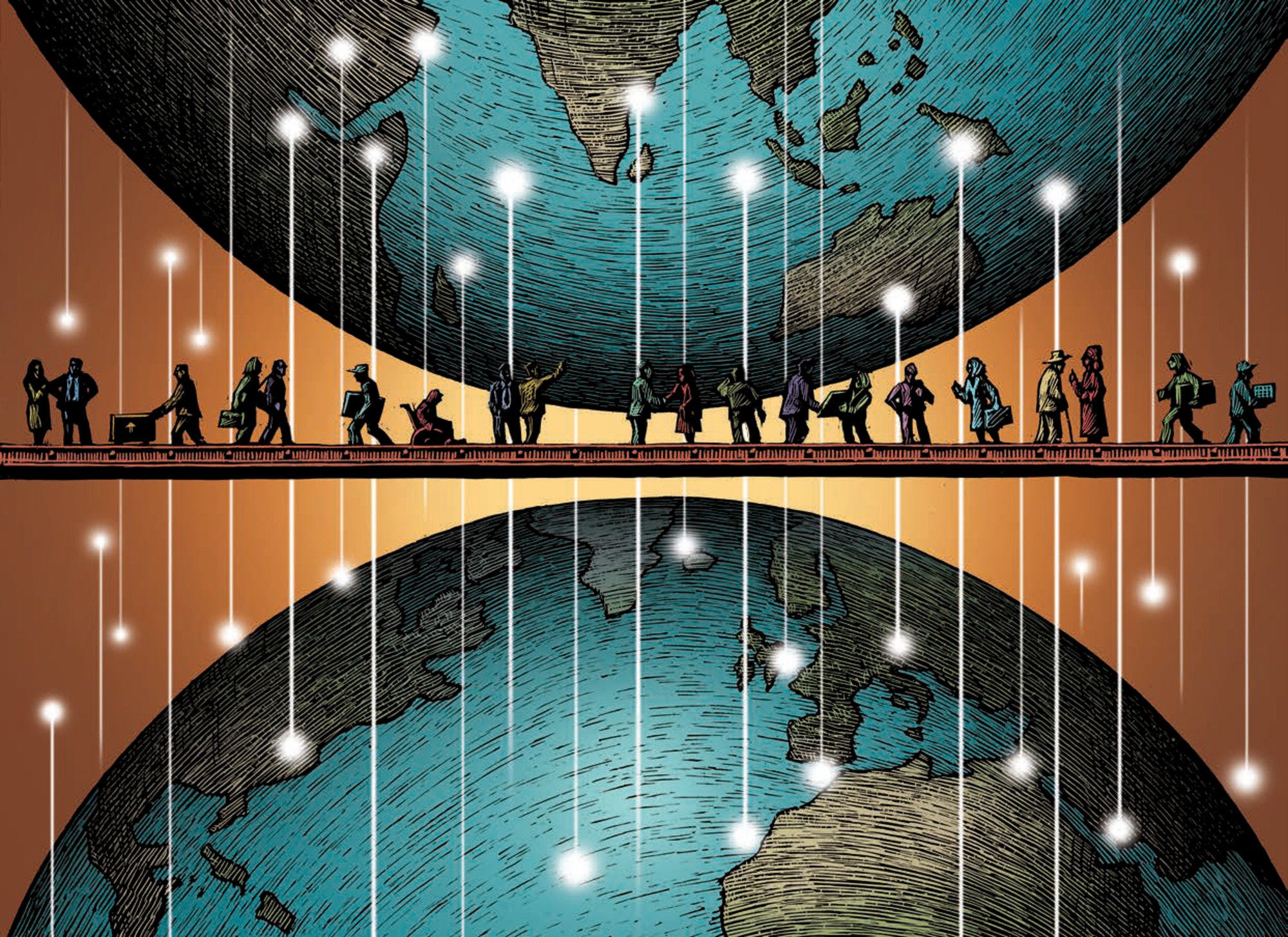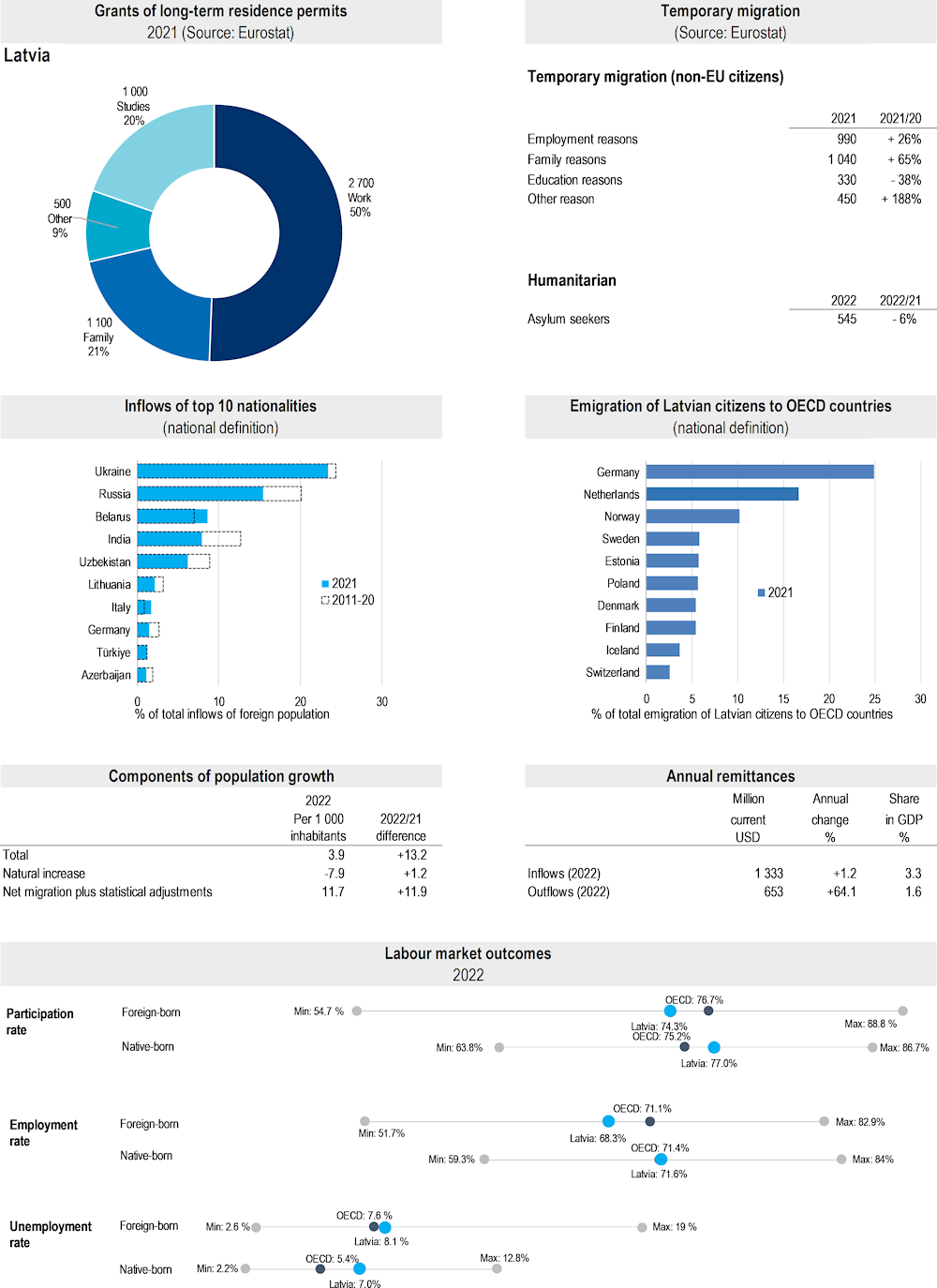In 2021, 5 300 new immigrants obtained a residence permit longer than 12 months in Latvia (excluding EU citizens), 55.2% more than in 2020. This figure comprises 50.6% labour migrants, 20.8% family members (including accompanying family), 19.7% who came for education reasons and 9% other migrants. In addition, Latvia received 700 immigrants benefitting from free mobility. Around 300 short-term permits were issued to international students and 1 000 to temporary and seasonal labour migrants (excluding intra-EU migration). In addition, 2 200 intra-EU postings were recorded in 2021, a ‑16% decrease compared to 2020. These posted workers are generally on short-term contracts.
Ukraine, Russia and Belarus were the top three nationalities of newcomers in 2021. Among the top 15 countries of origin, Ukraine registered the strongest increase (+400) and Uzbekistan the largest decrease (‑40) in flows to Latvia compared to the previous year.
In 2022, the number of first asylum applicants decreased by ‑6%, to reach around 500. The majority of applicants came from Russia (100), Afghanistan (100) and Belarus (65). The largest increase since 2021 concerned nationals of Russia (+90) and the largest decrease nationals of Iraq (‑300). Of the 400 decisions taken in 2022, 58% were positive.
Emigration of Latvian citizens to OECD countries increased by 15% in 2021, to 11 000. Approximately 25% of this group migrated to Germany, 17% to the Netherlands and 10% to Norway.
In June 2022, the Immigration Law was amended to introduce remote work visas. Under this scheme, a long-stay visa for one year can be requested by third country nationals who are employed by an employer registered in any other Member State of the OECD or are registered as self-employed persons in these countries, and who can perform their duties remotely while staying in the Republic of Latvia. The visa may be renewed for a period of one additional year. Remote work visa recipients do not have the right to employment in Latvia.
In August 2021, the Cabinet of Ministers issued an order declaring a state of emergency in administrative territories along the Latvian-Belarusian border in response to the heightened risks of irregular border crossings and hybrid attacks, which was extended in 2022.
Several legislative changes were introduced in response to Russia’s war of aggression against Ukraine. On 5 March 2022, the Law on Assistance to Ukrainian Civilians came into force, activating temporary protection and outlining reception and integration support measures for persons fleeing Ukraine. The law also defines Ukrainian civilians as a group at risk of social exclusion. Multiple amendments to the law were passed throughout the year to adjust further and extend available support measures. In April 2022, the issuance of first temporary residence permits to citizens of the Republic of Belarus and the Russian Federation was suspended, allowing for some exceptions, including family reunification. In September 2022, amendments to the Immigration Law entered into force, terminating in most cases the possibility of extending temporary residence permits granted through investments or the purchase of real estate for Russian and Belarusian citizens. In September, the Cabinet of Ministers adopted a decision to restrict the entry of Russian citizens holding Schengen short-stay visas for non-essential purposes, for instance, tourism and leisure. The decision was adopted in a concerted manner by Estonia, Latvia and Lithuania, and took effect simultaneously in the three Baltic States on 19 September 2022.
In April 2022, the Citizenship Law was amended to allow for the revocation of Latvian citizenship from dual nationals in the case of committing actions that undermine or put at risk democratic countries’ territorial integrity, sovereignty, and independence.
For further information: www.pmlp.gov.lv | www.csp.gov.lv | www.emn.lv

